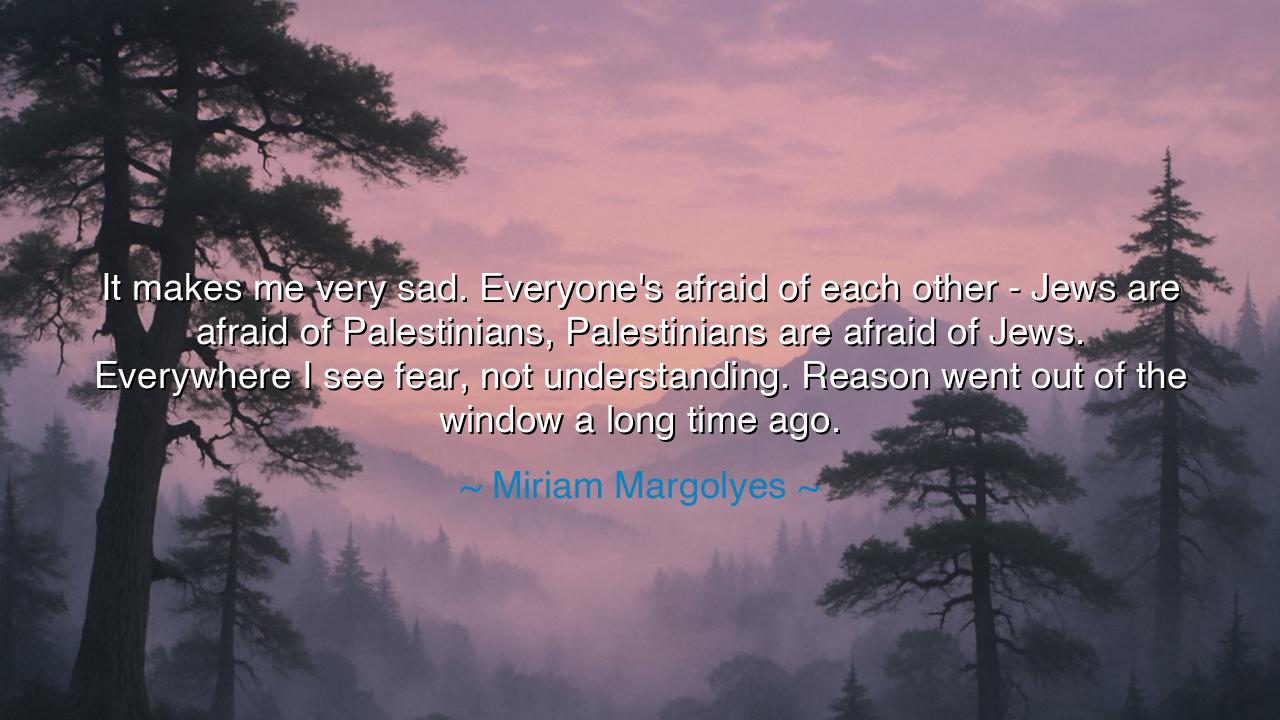
It makes me very sad. Everyone's afraid of each other - Jews are
It makes me very sad. Everyone's afraid of each other - Jews are afraid of Palestinians, Palestinians are afraid of Jews. Everywhere I see fear, not understanding. Reason went out of the window a long time ago.






The words of Miriam Margolyes, “It makes me very sad. Everyone's afraid of each other – Jews are afraid of Palestinians, Palestinians are afraid of Jews. Everywhere I see fear, not understanding. Reason went out of the window a long time ago,” are heavy with sorrow and clarity. They are not the cold analysis of politics, but the lament of a soul who sees humanity consumed by fear. She names a tragedy that is not confined to one land or people, but which belongs to the whole human story: when fear becomes the common tongue, peace withers and reason flees.
The origin of this reflection lies in Margolyes’ own Jewish heritage and her willingness to speak honestly about the pain of conflict. In her words is the mourning of one who looks at both sides of a centuries-old struggle and sees not monsters, but people, each paralyzed by fear of the other. Fear, she teaches us, becomes a greater enemy than either people realize. It poisons the well of dialogue, builds walls higher than stone, and blinds hearts to the humanity that remains on the other side.
History gives us many mirrors of this tragedy. Recall the Cold War, when Americans and Soviets, though sharing a planet, lived decades in terror of each other. Each feared annihilation, each mistrusted every gesture of the other, until reason nearly gave way to madness. Or consider the wars of religion in medieval Europe, where Christians killed Christians, each side convinced the other was possessed by evil, forgetting that they both knelt before the same God. In every such case, fear destroyed understanding and turned neighbor into enemy.
Margolyes’ sorrow is sharpened by her recognition that reason has been abandoned. Reason, that noble faculty by which humankind might listen, question, and bridge differences, has been drowned in noise. In its place stand suspicion, anger, and grief. When reason dies, reconciliation dies with it, and conflict perpetuates itself endlessly. To her, this is not simply a political reality, but a human tragedy—the wasting of generations in suspicion, rather than the building of futures in cooperation.
And yet, within her lament lies a hidden call to courage. For if fear is the enemy, then the antidote is not more suspicion, but deliberate acts of understanding. To look into the eyes of the other and see not a threat, but a fellow human, requires strength far greater than the force of arms. This is the heroism she longs for: not the heroism of battle, but the heroism of compassion.
The lesson is profound: fear divides, but understanding heals. We must not allow fear to rule our hearts, for it robs us of both reason and love. To overcome such fear, we must seek out dialogue, education, and the courage to listen even when it hurts. Families must teach their children not suspicion but empathy; leaders must seek peace not through weapons but through wisdom.
Practically, this means that each of us must resist the easy temptation of suspicion toward those who are different. It means speaking words of compassion rather than words of scorn, and daring to imagine the life of another before we judge them. It means honoring truth, reason, and dialogue as sacred tools for peace.
Thus, Miriam Margolyes’ sorrowful words stand as a warning and a teaching. When fear rules, reason dies, and with it, humanity itself. But if we can summon the courage to replace fear with understanding, to restore reason to its rightful place, then even the deepest divides may yet be bridged. This is not naïve hope—it is the only path by which peace has ever been won in the long story of humankind.






AAdministratorAdministrator
Welcome, honored guests. Please leave a comment, we will respond soon